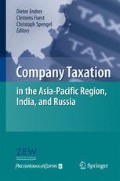Abstract
The analysis in the preceding sections has focused on describing the tax burden faced by different types of foreign investment in the Asia-Pacific Region. In this section, we discuss the interaction between corporate tax burdens and actual foreign direct investment flows. In recent decades, governments across the world have become increasingly concerned about the impact of taxes on international investment flows. High tax countries fear that the tax burden on corporate investment may lead to a relocation of economic activity to countries with lower taxes. Some countries have actively pursued a low tax strategy with the objective to attract investment from other countries. In Europe, the significant decline in corporate income tax rates which occurred during the last two decades is widely seen as reflecting the forces of corporate tax competition. In East Asia, governments are at least as concerned about attracting foreign direct investment as governments in other regions. The location of foreign direct investment depends on a large number of factors. Next to taxes, these include the proximity to clients or suppliers, the availability of key inputs like qualified employees or financial services, regulations, political stability of a country and many more. But the particular importance of taxes is due to the fact that taxes can be changed relatively easily and quickly whereas other important factors like e.g. proximity to markets or the availability of qualified employees can either not be changed at all or only in the long term.
Access this chapter
Tax calculation will be finalised at checkout
Purchases are for personal use only
Notes
- 1.
We exclude Japan and Australia because they are established OECD countries, where FDI flows are driven by rather different economic forces. Russia is a special case because of its geographical extension and Vietnam and Cambodia are excluded mainly because of limited data availability.
- 2.
A 1% increase in GDP (with constant GDP per capita) lowers FDI by 4.8%.
- 3.
For example, the Netherlands had to abolish preferential treatment for logistics centres. The Channel Islands had to abandon the practice of ring-fencing their off-shore financial industry.
- 4.
Although all countries constantly announce reforms of their special incentive programs, the eventual adjustments are very marginal for the period from 2002 to 2007, for which FDI data across sectors is available. Hence differences over time cannot be exploited to identify the effect of incentive programs.
- 5.
The result is based on cross-sectional variance. Hence, the argument can justifiably be turned around. Countries may install special tax incentives for sectors in which they are already attractive for foreign investors. This could imply that foreign investors are able to lobby for their advantage.
References
Keen M (2001) Preferential regimes can make tax competition less harmful. Natl Tax J 54:757–762
Klemm A (2009) Causes, benefits, and risks of business tax incentives. In: IMF Working Paper No. 09/21
Author information
Authors and Affiliations
Corresponding author
Editor information
Editors and Affiliations
Rights and permissions
Copyright information
© 2010 Springer-Verlag Berlin Heidelberg
About this chapter
Cite this chapter
Endres, D., Fuest, C., Spengel, C. (2010). Corporate Taxation and Foreign Direct Investment Flows. In: Endres, D., Fuest, C., Spengel, C. (eds) Company Taxation in the Asia-Pacific Region, India, and Russia. Springer, Berlin, Heidelberg. https://doi.org/10.1007/978-3-642-12217-0_6
Download citation
DOI: https://doi.org/10.1007/978-3-642-12217-0_6
Published:
Publisher Name: Springer, Berlin, Heidelberg
Print ISBN: 978-3-642-12216-3
Online ISBN: 978-3-642-12217-0
eBook Packages: Humanities, Social Sciences and LawLaw and Criminology (R0)

